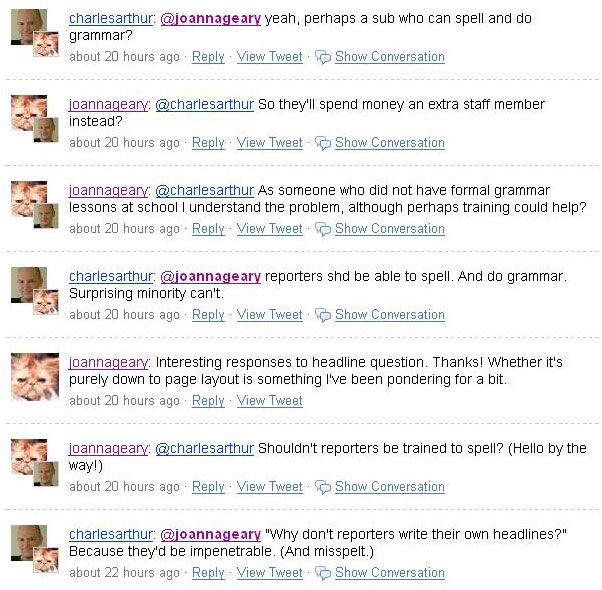A few months ago I shot a video on a borrowed N95 mobile outlining the reasons why I thought newspaper journalists were going to have to be more public and transparent on the web.
Media was becoming increasingly personality driven as users decide which sources to trust and which to reject, I argued. People want to know who is behind the news and what they stand for.
It was the first time I had put myself “out there” and, I have to admit, it wasn’t altogether a comfortable experience. I had always said I was happy being a newspaper journalist because it gave me the luxury of standing behind the photographer’s camera. Not anymore.
But, by becoming more visible, I met a wealth of interesting individuals on platforms such as Seesmic and Bambuser who have talked, debated and helped me learn so much more about what the web can offer. Going public didn’t seem so scary after all.
So when my editor Marc Reeves asked if he could put me forward as a potential panellist for The Big Debate I agreed. Three months ago I wouldn’t have dared but, I reasoned, how much worse could it be than doing a Seesmic post?!
Of course, it was far more nerve-wracking, but I was very glad to be given the opportunity to do it. There were a number of firsts and innovations that took place at The Big Debate that I am very proud of and will post about later.
But it also demonstrated the flipside of going public.
Someone who either watched the debate at the ICC or online decided that they did not like me. Not just that they didn’t like my arguments on the future of regional newspapers, but that they didn’t like me. So much so that they intimated in a comment on my blog that I must have done something rather unsavoury to get myself on the panel. The full comment, which was originally on my ‘about’ page, and the responses to it have been put into a seperate post.
That was pretty upsetting. The odd thing was that, when I read the first line, I was glad to see someone had been critical of what I said. I can learn from criticism.
But, when I realised it was turning into a personal attack, it became something altogether different. It felt threatening and misogynistic. After all, how many men have been accused of sleeping their way onto a panel? It was also a rather unhappy thing to learn that the IP address was local.
Now I know enough about flamers to have expected this to happen at some point. The web allows people to hide behind relative anonymity and, as a recent debate on women and the Internet suggests, it could have been far nastier. But it still knocked me a bit and led me to wonder: how many regional newspaper journalists are prepared for dealing with such comments online?
There are two issues at stake here:
1. The emotional response:
I can easily imagine journalists who are not used to online debate feeling very threatened. How would you prepare someone to deal with this and put it into context? It would be a great shame and loss if such a comment made them withdraw from online conversations altogether.
As an aside, I wonder if the current reluctance shown by some journalists to engage with readers online is, in part, a response to some of the comments that can be found in the old-style, poorly moderated, regional newspaper Internet forums where flamers are rife.
2. The public response.
How easy is it for someone who has been attacked to hit back in a similar way? Very: an individual that is hurt, angry and feels unfairly targeted is going to want to bite back with an equally nasty comment. I’ve seen it happen time and time again on blogs.
But, by hitting back, the conversation is only dragged further down into the depths of ignorance, anger and spite – hardly the qualities that are desirable in a journalist. Whilst it might be a perfectly understandable response to a nasty comment, I’m not sure it would be seen as acceptable.
As commenting is such an easy thing to do and can be done in seconds – without prior moderation by news editors or subs – it would seem necessary to develop some sort of strategy or format for journalists to use in dealing with personal comments.
I stress that there is also need for journalists to be able to distinguish between attacks on their points of view and attacks on their person. We must be able to accept strong, vociferous criticism of our ideas and show that we are capable of responding reasonably and intelligently. I think it’s easy for people to mix the two up.
All of the concerns above suggest to me that, as regional newspaper organisations push their journalists into a more public online arena, a little bit of guidance and support is needed to help them deal with the negative side of transparency.
One thing that has emerged from this is that I am lucky to be part of a strong online community (as can be seen by comments here and on Twitter) that will be very vocal if they see something unacceptable or offensive. I am thankful for that.




